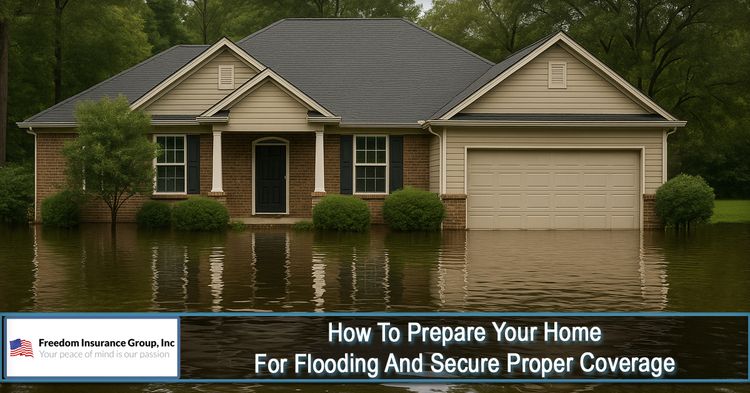
Flooding is one of the most common and costly natural disasters homeowners face. Whether caused by heavy rainfall, storm surge, melting snow, or even clogged drainage systems, floodwaters can damage a home quickly and extensively. While we can’t control the weather, we can take meaningful steps to reduce risk and prepare financially and physically for potential flooding.
Proper preparation combines home protection measures with the right insurance coverage—ensuring that if a flood does occur, your home and finances are better protected.
Understanding Flood Risk
Even if your home is not located in a designated high-risk flood zone, flooding can still happen. In fact, over 20% of flood insurance claims come from properties outside high-risk areas.
- Flood Risks Can Increase Due To:
- Heavy or prolonged rainfall
- Overflowing rivers or streams
- Poor drainage or urban development
- Hurricanes or tropical storms
- Rapid snowmelt
- Aging infrastructure and drainage systems
The first step is to find out your flood zone rating using FEMA’s Flood Map Service Center or ask your insurance agent for guidance.
Home Preparation Steps to Reduce Flood Damage
Taking preventive measures can help minimize damage and speed up recovery if flooding occurs.
1. Inspect and Maintain Gutters and Drains
- Clean gutters at least twice per year.
- Ensure downspouts direct water at least 5–10 feet away from the home.
- Remove yard debris to prevent drainage blockage.
2. Seal Vulnerable Entry Points
- Use waterproof caulk to seal gaps around doors, windows, and foundations.
- Install weatherstripping to reduce moisture seepage.
3. Elevate Utilities and Appliances
- Raise water heaters, HVAC systems, and electrical panels above expected flood levels.
- Store important documents in waterproof containers.
4. Install Backflow Prevention
- A backflow valve helps stop sewage from flowing into your home during heavy flooding.
5. Prepare an Emergency Plan
- Keep sandbags, flashlights, and first-aid supplies on hand.
- Create an evacuation and communication plan for your family.
Landscaping for Flood Prevention
Strategic yard care can help direct water away from your home.
Helpful Landscaping Practices:
- Grade your yard to slope away from your foundation.
- Use gravel instead of mulch, which can wash away.
- Plant water-absorbent shrubs or native grasses around the property.
Does Homeowners Insurance Cover Flood Damage?
In most cases, no.
Standard homeowners insurance does not cover damage caused by flooding.
To protect your property financially, you’ll need flood insurance.
Understanding Flood Insurance Coverage
Flood insurance can be purchased through the National Flood Insurance Program (NFIP) or through private flood insurance carriers.
What Flood Insurance Typically Covers:
- Foundation damage
- Walls, flooring, and built-in appliances
- Electrical and plumbing systems
- Personal belongings (depending on coverage type)
What It May Not Cover:
- Temporary housing costs (unless added through private insurance)
- Basement improvements like carpeting or finished walls
- Damage from neglect or lack of maintenance
Because flood insurance policies often have a 30-day waiting period, it’s smart to secure coverage before severe weather season.
Local Insight: Hickory, NC
Flooding can occur in unexpected neighborhoods, especially during heavy rainstorms common in Hickory, NC. Even if your property isn’t near a major waterway, saturated soil and storm runoff can still cause water intrusion. Checking your flood risk and reviewing insurance options ensures your home is better protected.
How to Secure the Right Flood Insurance Policy
Steps to Take:
- Review your current homeowners insurance policy for exclusions.
- Determine your flood risk level using FEMA mapping tools.
- Compare NFIP and private flood insurance options.
- Ask about building coverage and contents coverage limits.
- Reassess your policy annually or after home improvements.
- Working with an experienced insurance agent can help tailor a policy that fits your home and your budget.
Conclusion
Preparing your home for flooding is a combination of preventive home maintenance and thoughtful insurance planning. By improving drainage, maintaining your home’s exterior, and securing the right flood insurance coverage, you can significantly reduce your risk of costly damage and stress.
Floods can come with little warning—but the right preparation can make all the difference.
At Freedom Insurance Group, Inc., we aim to provide comprehensive insurance policies that make your life easier. We want to help you get insurance that fits your needs. You can get additional information about our products and services by calling our agency at 828-322-7474. Get a free quote today by CLICKING HERE.
Disclaimer: The information presented in this blog is intended for informational purposes only and should not be considered as professional advice. It is crucial to consult with a qualified insurance agent or professional for personalized advice tailored to your specific circumstances. They can provide expert guidance and help you make informed decisions regarding your insurance needs.
